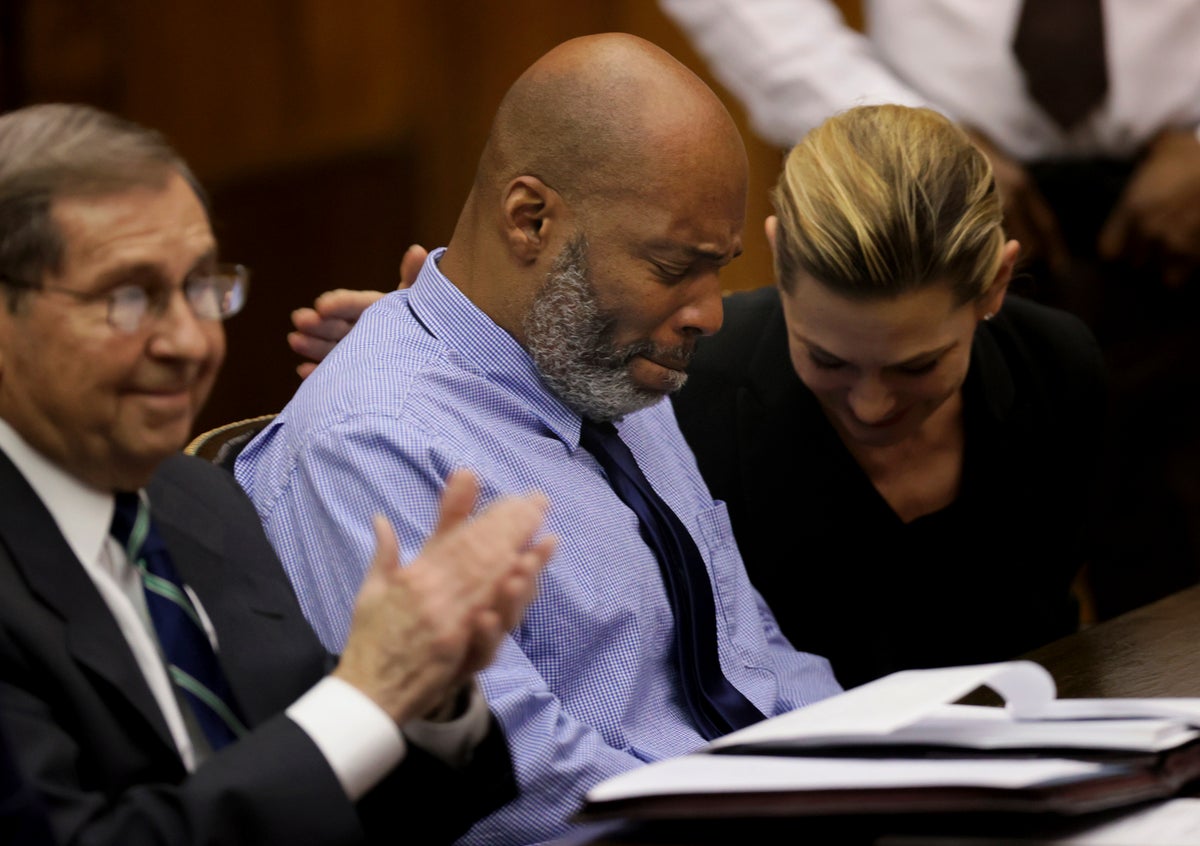
As racial justice activists in Missouri celebrate the overturned conviction of Lamar Johnson, they're questioning why other inmates with credible innocence claims aren't getting the chance to make their cases in court.
A Missouri law enacted in 2021 allows prosecuting attorneys to request a hearing before a judge in cases of possible wrongful convictions. In the year-and-a-half since, just two hearings have occurred. A judge in Kansas City in November 2021 overturned the conviction of Kevin Strickland, who spent four decades in prison in a triple murder case.
And on Tuesday, St. Louis Circuit Judge David Mason overturned the sentence of Johnson, who spent nearly 28 years in prison for the death of a St. Louis man. A little over an hour after Mason's ruling, Johnson walked out of the courthouse a free man.
The Missouri NAACP has compiled a list of seven inmates with claims the organization believes are credible enough to be heard by a judge immediately, and NAACP President Nimrod Chapel Jr. said there are many more whose cases deserve further investigation.
“We understand and believe that there are many people who have valid innocence claims that are not being brought before the courts,” Chapel said. “And so, while taxpayers are paying for innocent people to be in jail, those same lives are being wasted away.”
Jamala Rogers of the St. Louis-based Organization for Black Struggle said many innocence claims “never see the light of day” because proving it is expensive, often requiring teams of lawyers and testimony from paid experts.
“It's not a good situation, and there are many more Lamar Johnsons languishing in Missouri prisons and across the country,” Rogers said.
It was Johnson's case that spurred the new Missouri law.
Democratic St. Louis Circuit Attorney Kim Gardner reviewed Johnson's innocence claims and believed them. But the Missouri Supreme Court refused to grant a new trial in March 2021. The court said its ruling wasn’t about whether Johnson was innocent but only addressed if prosecutors could seek a new trial years after the initial conviction.
Struck by the fact that potentially innocent people could be imprisoned on a technicality, lawmakers passed the new law giving prosecutors an avenue to address potential wrongful convictions.
Legal experts agree the process is complicated and can't be rushed.
“These cases are not easy, and they shouldn’t be,” Mason said in his ruling.
Prosecutors in Missouri's three largest jurisdictions — Gardner, St. Louis County Prosecuting Attorney Wesley Bell and Jackson County Prosecuting Attorney Jean Peters Baker in Kansas City — have created conviction integrity units to examine possible wrongful conviction cases. All three are Democrats.
Gardner said her investigators receive hundreds of requests annually from inmates and their relatives.
“We will continue to fight to bring these cases to light and deliver justice,” she said in a statement.
Michael Mansur, a spokesperson for Peters Baker, said Jackson County investigators constantly review applications but have so far filed only in the Strickland case.
Bell said his review team has 130 open applications they're currently looking at.
“Like every aspect and dimension of criminal justice, conviction integrity review proceeds very deliberately - often, too slowly for advocates working outside of the system,” he said in a statement.
Bell examined the innocence claim from a Missouri death row inmate, Raheem Taylor, before determining in January that “the facts are not there to support a credible case of innocence.” The decision disappointed racial justice advocates. Taylor was executed Feb. 7 for killing his girlfriend and her three young children.
Peters Baker was the first to use the new law, doing so on behalf of Strickland, who maintained that he was home watching TV when the crimes were committed. In November 2021, Judge James Welsh ordered Strickland freed, citing “clear and convincing evidence" in his favor.
Then-Attorney General Eric Schmitt had fought to keep Strickland incarcerated. Schmitt was elected to the U.S. Senate in November. Gov. Mike Parson appointed Andrew Bailey as the new attorney general. Schmitt, Parson and Bailey are all Republicans.
Lawyers from the attorney general's office also argued against freeing Johnson. Chapel said the NAACP was “disappointed” the attorney general's office opposed Johnson's release “despite the overwhelming evidence of his innocence.”
Madeline Sieren, a spokesperson for Bailey, said in a statement that the office “defended the rule of law and worked to uphold the original verdict that a jury of Johnson’s peers deemed to be appropriate based on the facts presented at trial.”
Johnson's legal team said justice was eventually served, but the system needs improvement.
“It took an innocence organization, three law firms, the Circuit Attorney, both chambers of Missouri’s legislature and the Governor’s signature on a law passed for him, to free Lamar Johnson," Johnson's lawyers said in a statement. "That is intolerable. That is not justice. We can and must do better.”







